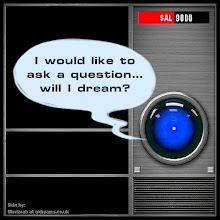 When you approach upper management of XYZ Corp with complaints, or facts, that someone in management could be doing a bad job -- or perish the thought acting unethically -- they put on the facade of being highly insulted and in complete utter denial that any of their ranks could not be perfect upright specimens of mankind (in which case they are also more highly evolved than you as well). They cannot fathom admitting that any of the human beings that have been entrusted with the power in the company to edify or destroy people's lives, could ever actually be fallible in any way. Oh no. So I've decided that this must be "Step One In Destroying The Complainer's Grounds For Argument" in the management manual.
When you approach upper management of XYZ Corp with complaints, or facts, that someone in management could be doing a bad job -- or perish the thought acting unethically -- they put on the facade of being highly insulted and in complete utter denial that any of their ranks could not be perfect upright specimens of mankind (in which case they are also more highly evolved than you as well). They cannot fathom admitting that any of the human beings that have been entrusted with the power in the company to edify or destroy people's lives, could ever actually be fallible in any way. Oh no. So I've decided that this must be "Step One In Destroying The Complainer's Grounds For Argument" in the management manual.In all fairness, every institution from religious organizations to the local sanitation department tries first to deny wrong-doing before ever opening their eyes to seeing and fixing a problem. It all depends on the ethics of the individuals in charge, and how much they might be willing to take accountability. If no accountability or ethics are to be found there, the person who has been wronged and damaged hits the first brick wall in the "open door" policy. If the victim manages to blast through this wall, rest assured, there are many more set up to block further advancement. But this first block is the one management bets on working the best. If they can nip the problem in the bud at this first pass, the complainer is defeated and no action needs to be taken that would upset the heavenly daily life of upper management. Because we all know that if you hear no evil, and see no evil, then you don't have to say or do anything to fix the evil.
The problem is of course, that no human being is infallible. Everyone has the potential to make a mistake. It's inscribed in our very existence and an unavoidable risk that we each live with every day. And herein lies the deepest-seated disease at the core of XYZ's current culture: the attitude that management can never make mistakes. Now, if XYZ recruits its managers from some far off planet where human beings are perfect, and ships them off to work in the XYZ plants on Earth, then this might be an arguable point. In that case, they would indeed be able to say that no problems or breaches of ethics are ever enacted by XYZ managers and therefore no action is needed to be taken to correct the problem that does not exist. Also, that the complainant is indeed lying about their grievance. But we know that's not possible, and in trying to pretend that they believe in this fairy tale, management makes itself look like total buffoons. But what do they care, all they know is that they got rid of you and the rest of their day is hopefully not upset by your rude interruption in questioning their ethics.
"There may be individuals...who did not live up to your highest standards - no institution and no social system can guarantee that automatic perfection of all its members; this depends on an individual's free will" -- Ayn Rand ("Who Needs Philosophy", speech given to West Point graduating Class of 1964)



